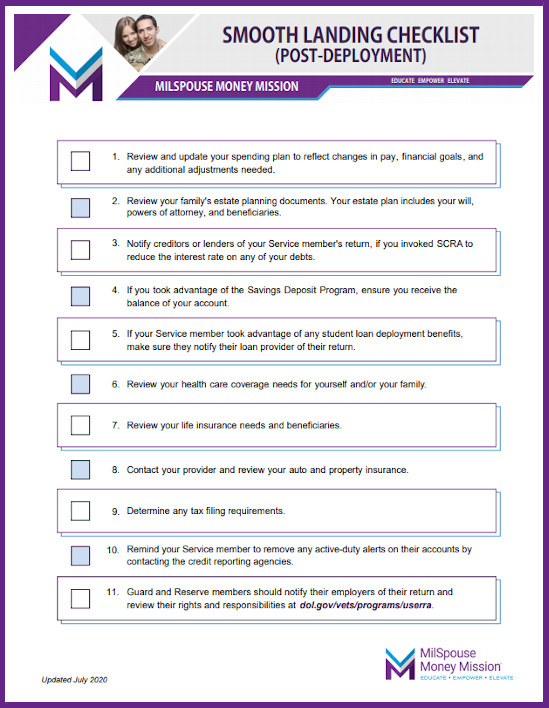1
Getting Started
Returning from a deployment is a wonderful time to get back into routines and catch up with family and friends.
Chances are, you have probably noticed a few changes in your life now that your Service member is home, and one is likely your finances. It is common that your spouse’s military pay has decreased and your family’s expenses have increased.
Melissa wants to share her tips for a positive post-deployment homecoming.

Read on for some great suggestions to manage the adjustments in your financial situation following a deployment.
Spending Plan Update
Did you set any financial goals prior to deployment? If so, go back and revisit those goals and evaluate your progress. If not, now is a great time to set new financial goals for the future. Set goals that are S-M-A-R-T: Specific, Measurable, Attainable, Relevant, and Time-bound. Keep these goals in mind moving forward.
Make changes to your family budget to address changes in income and expenses. Look over your spouse’s Leave and Earning Statement (LES) together to see what deployment-related pay has gone away. This can include hazardous duty, hostile fire, and Family Separation Allowance (FSA). Also, if your spouse deployed to a combat zone, they may have been receiving tax-free income benefits may have ended. Plan and adjust your budgets for the decrease. Also consider possible increases in expenses. Increased housing, transportation, or entertainment costs should be factored into your family’s new post-deployment budget.
If you need a little extra help getting started on your budget updates, watch the videos at the bottom of the Create a Budget section of the Money Ready guide to give you a four-step process. Click here.
It is so great to be back together that you may want to take a last-minute vacation or make a large spontaneous purchase. These “feel-good” purchases can negatively impact your budget and long-term goals if you haven't prepared or planned for them. So, take a brief pause and decide if this is the right thing for your family at this point. As an alternative, set the purchase as a goal and plan for it, or treat yourself to something smaller that won't break the bank. Consider how a big purchase with an ongoing financial commitment (like a new car with a five-year loan) will impact your post-deployment budget. Evaluate your long-term goals like saving for retirement or your children’s college education and make sure you're are still on track.
There are several programs that provide financial benefits during deployment, but they end once your spouse is home.
- Servicemembers Civil Relief Act (SCRA)
This program provides certain lending protections for those called to Active Duty. One common example is lowering interest on debts to 6% during deployments. If used, you are required to contact your creditors and inform them the deployment has ended. Click here for more information on SCRA. - Student Loan Interest Relief
This program can reduce your student loan interest to zero while deployed, but you must contact your lenders when you get back. - Savings Deposit Program (SDP)
This account will continue to earn the 10% annual interest rate for 90 days after deployment and will then be deposited into your account 120 days after leaving the combat zone, so be sure the Defense Finance Accounting Service (DFAS) has the correct information. Discuss how to use these resources before the money is distributed.
2
Financial Planning Considerations
You may have had a few extra expenses during the deployment. Maybe you had car trouble, or an appliance needed repairs. This is a good time to check your savings account and develop a plan to replenish these funds. Making this a priority will save you headaches and save your pocketbook in the long run. Experts suggest having three to six months of living expenses set aside. How does your account look?
Did you increase Thrift Savings Plan (TSP) contributions during the deployment? If so and that no longer fits into your cash flow, be sure to visit myPay and make the adjustment if necessary. Keep in mind, if you fall under the BRS, keeping the TSP contribution at a minimum of 5% will allow your spouse to receive the full 5% matching contribution. That’s free money! Be sure to factor that in when reviewing your TSP.
It is always a good idea to have your legal documents in good order. The period after a deployment is a great time to revisit your estate plan and make sure it is still in line with the needs of your family and your current wishes.
- Power of Attorney — Did you set up a power of attorney before deployment? Consider if it should be cancelled, revoked or updated.
- Will — Review your will and make sure it is in accordance with your current needs and wishes.
- Named Beneficiaries — Many assets are passed on to others by named beneficiaries. It is a good idea to review beneficiaries for accounts like your spouse’s TSP, Servicemembers' Group Life Insurance (SGLI), and any other personal banking or investment accounts.
- Health — Active duty Service members will not see a change in health coverage. Visit the section below pertaining to special circumstances that impact Guard and Reserve Service members.
- Life — Go over your life insurance coverage and ensure the levels are appropriate for your current needs. Visit Money Ready 201: Insure Your Family for more information on the types of insurance and how much you should have.
- Auto and Property — Contact your auto insurance carrier to resume coverage when your spouse returns home if your family designated a vehicle as “not in use” during deployment. Make sure to account for any increased premium cost in your family budget. Also, review your homeowners or renters insurance coverage as well.
Preventing identity theft is something we should always take into consideration. Your spouse may have set up an active duty alert or credit freeze during deployment. This prevents someone from fraudulently getting credit in their name, but now that they’re home it can be disabled.
- Active duty alert — Each credit agency must be contacted separately.
- Security or credit freeze — Contact each agency separately by phone to remove the freeze. Download the PDF below to get started.
- Visit Protect Your Identity for more information.
Your spouse might have been receiving tax-free income if in a qualifying combat zone. This changes upon their return and income taxes come out of their income so there will be an impact to the household budget.
Every situation is different and your state of residency or domicile varies so be sure to consult with a tax advisor for help.
Also ensure you file your taxes in a timely manner to avoid penalties and interest. Just because your spouse was deployed doesn’t mean you get a pass on filing. For additional help, visit the Military OneSource MilTax webpage for tax information by clicking here.
Download this quick checklist to use as you reunite your family and finances.

3
Resources
Please visit the links in each section to get more information. Post-deployment is an exciting time, but it does present some financial challenges. With knowledge and planning, you can achieve your financial goals and succeed!
1. Servicemembers Civil Relief Act (SCRA)
2. Student Loan Interest Relief
3. Savings Deposit Program (SDP)
Money Ready 201 — Insure Your Family
- Life
- General Health
- Health Insurance for Guard and Reserve
- Auto Insurance
- Property
- TransUnion – 1-800-680-7289
- Experian – 1-888-397-3742
- Equifax – 1-800-525-6285
- Uniformed Services Employment and Re-employment Rights Act of 1994 (USERRA)
- Reintegration (Military OneSource)
Remember, every family’s situation is different. Your needs, goals, and wishes are unique. What works for one family may not be right for yours. Evaluate where you are and where you want to go. You’re not alone, if you’d like to meet with a Personal Financial Manager on your installation, click here to locate yours https://installations.militaryonesource.mil/
Recent Blogs
Honoring the Heart of Our Military: The Resilient Spouses
Military spouses are the unsung heroes of our military community. Their unwavering dedication, resilience and incredible adaptability are the backbone of our military families and communities. Military spouses manage households, raise families, often pursue careers or volunteer tirelessly, all while navigating the unique challenges of military life — frequent moves, deployments, and the emotional toll…
Read MoreGiving Military Kids the Tools to Be Financially Capable
Military families are known for resilience, yet the frequent moves, deployments, and changes in income that come with military life can make financial stability feel like a juggling act. But these unique challenges may offer a golden teaching opportunity for military kids. By talking about finances openly and equipping kids with financial skills early on,…
Read MoreMarch Money Moves: Navigating Tax Season While Preparing for Summer Fun
As we welcome the arrival of spring and the promise of warmer weather, it’s easy to get caught up in thoughts of summer plans and family vacations. But with tax season in full swing, it’s important to balance excitement for the upcoming months with a push to wrap up tax season. While those topics couldn’t…
Read MoreCommunicating with Your Partner About Finances: A February Focus on Financial Wellness
Talking Money with Your Partner As we celebrate loving relationships this month, it’s important to remember that not all conversations come up roses between couples. Sometimes discussing finances can be tricky and stir up negative emotions. Open communication about money is vital for building trust and nurturing a healthy relationship. Whether you’re a new couple…
Read MoreBuild Financial Wellness from the Ground Up in 2025
There’s something magical about the ball dropping at midnight and turning the page to a new year. For an instant, it feels like you’ve got a clean slate, and anything is possible. In some ways that’s true, but as the calendar page turns, your responsibilities, bills and financial challenges remain. Many people make resolutions to…
Read More5 Financial Resolutions to Start the New Year Off Right
You don’t need to wait until January to take a fresh look at your finances. Get a jump on the new year with these five resolutions — they can really pay off over the next 12 months. 1. Set/update your budget Setting a budget is the first step in a military family’s financial planning. And…
Read More5 Financial Power Moves for MilSpouses
During National Veterans and Military Families Month in November, we salute the strength of our families as they support the mission of our community. MilSpouses, especially, display determination as they face the challenges of military life. We see you navigate frequent moves, deployments and often raising children as a solo parent. We understand your motivation…
Read MoreThe Year In Review: Bring Your Financial Picture into Focus
It can be fun and even eye-opening to watch those year-end montages reminiscing about the year. If you ever have that moment when you say to yourself, “Wait, that was this year?”, you could also imagine how easy it could be to lose track of the goals and financial plans you set in motion when…
Read More











